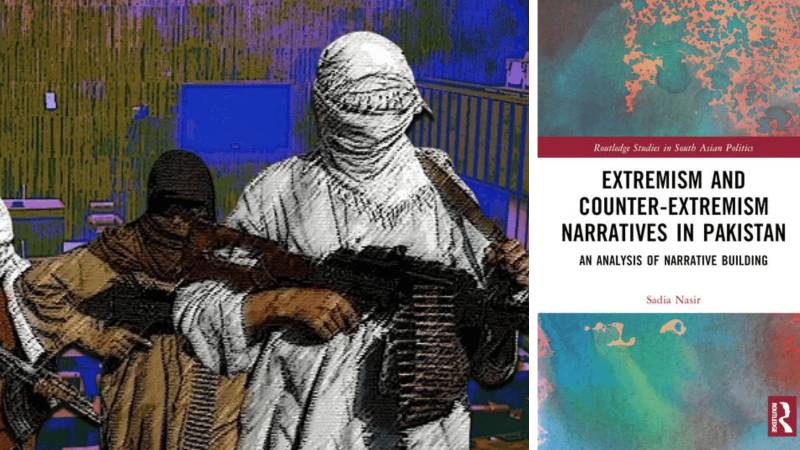
Terrorism is a significantly problematic issue that Pakistan still faces to this day. Although the number of terrorism-related incidents have resurged in the last few years, extremist ideas have always prevailed in Pakistani society. Dr Sadia Nasir's well-timed book on this subject, titled "Extremism and Counter-Extremism Narratives in Pakistan: An Analysis of Narrative Building", discusses the dominant discourse propagated by extremist groups and carefully explores the central issues related to extremism and counter-extremism narratives in Pakistan.
The author constructs three conceptual frameworks to build a theoretical model for understanding extremist and counter-extremist narratives. Firstly, Aristotle's rhetoric has been used to describe how the extremist narrative is composed and publicised among the masses. Secondly, the Copenhagen school of thought has been used to explain how the government and extremist elements have securitised extremism through the construction of threats and of threat perception. Lastly, the constructivist approach has been used to shed light on constructing a counter-extremist narrative.
This theoretical framework has elaborated on extremism, extremist narratives, and on counter-extremist narrative-building, thereby highlighting the areas for improving and designing a compelling counter-extremist narrative and giving significant depth to the book itself. It would help policymakers immensely to adopt this framework to deal effectively with issue of extremism using an informed and logical process.
Recognising the fact that there has been a decline of terrorism-related incidents in the years prior to the book's publication, the author maintains that extremism remains a chief threat to Pakistani society. She argues that extremism is not only a security issue, but is also an ideological, cultural, and social problem that has challenged the core values of Pakistani society. Extremist ideas prevalent in Pakistani society are the product of regional geopolitics, which provided more space to states for permitting extremist organisations to successfully propagate their narratives. The authorities have only focused on reducing violence and terrorism, while the root causes of the problem continue to run deep in society.
Dr Sadia Nasir's theoretical framework elaborates on extremism and on extremist and counter-extremist narratives, highlighting the areas for improving and designing a compelling counter-extremist narrative in Pakistan
Moreover, concepts like radicalisation, extremism, and terrorism are used interchangeably, which is misleading. These three terms differ in meaning but, when used interchangeably, have led to distinctions in methods used for treating these maladies. Therefore, Pakistan needs to redefine its security-centric counter-terrorism policies and adopt a more comprehensive approach for effectively dealing with extremism that is pervasive across Pakistani society.
The book's core is inherently a discussion of contradictory counter-extremist narratives and policies in Pakistan, where Dr Sadia fills the gaps in Pakistan's counter-extremist narrative policies and practices. The government has been unsuccessful in designing a compelling counter-extremist narrative because it has so far been unable to correctly diagnose the problem.
Policies which have already been adopted have not adequately involved the local stakeholders. Local social and religious norms should also be considered while formulating any policy that refutes extremist narratives. Most importantly, counter-narratives cannot work in a vacuum. They must be combined with other policies to address and overcome the drivers of extremism in society. The author also argues that, at some point in history, the Pakistani state began supporting extremist narratives and supported them for many years; therefore, building a counter-narrative to what has been its own narrative is a daunting challenge that has not been holistically dealt with so far.
Dr Sadia has not only delineated extremism in detail but has also explained the causes of the government's inability to bring forth a compelling counter-extremist narrative that is acceptable to society. A solution to this is crafting a counter-extremist narrative that keeps the ground realities, local culture, media, and religious scholars in mind. The messenger for communicating this narrative must also be credible in the eyes of the masses. The book gives examples of counter-extremism in Bangladesh, the UK, Indonesia, and Egypt as useful case studies that must be adopted as lessons for Pakistan's policymakers to learn from.
Counter-narratives do not work in a vacuum: they must be merged with other policies to adequately address and tackle the drivers of extremism in society
Dr Sadia is right about the gaps that exist in Pakistan's counter-extremist narrative policies. However, different government and non-government institutions have already done much work in this regard, albeit in disjoint silos. This work has nevertheless seen success, to some extent, in refuting extremist ideologies across Pakistan. It includes, but is not limited to, religious edicts of fatwas from various religious scholars.
Moreover, extremist ideas currently prevalent in Pakistani society are somehow influenced by regional geopolitical situations. The unending conflict in Afghanistan and the plight of Muslims in Indian-occupied Kashmir provide more space for religious extremists. The Taliban takeover in Afghanistan has further exacerbated the situation. Without a peaceful solution to these longstanding issues, it becomes extremely difficult for the Pakistani government to deal with extremists in their midst.
Despite the presence of these elements - which Martha Crenshaw termed as precipitant and pre-conditions of violent extremism - a significant portion of the Pakistani population has resisted violent extremism. In simple terms, it means that although violent extremist ideas are prevalent in Pakistan, society in general is resilient and resists the use of violent means to achieve sociopolitical objectives.
This does not mean that the government should turn a blind eye to those people and organisations who continue propagating extremist ideas in society. The government of Pakistan should adopt a comprehensive long-term policy at different levels so that extremist ideas get minimum attraction from the people of Pakistan. Dr Sadia's book "Extremism and Counter-Extremism Narratives in Pakistan: An Analysis of Narrative Building" is an exceptional body of work in this field and will help policymakers and researchers immensely in endeavours pertaining to devising counter-narratives and policies to rid Pakistan of this menace.

